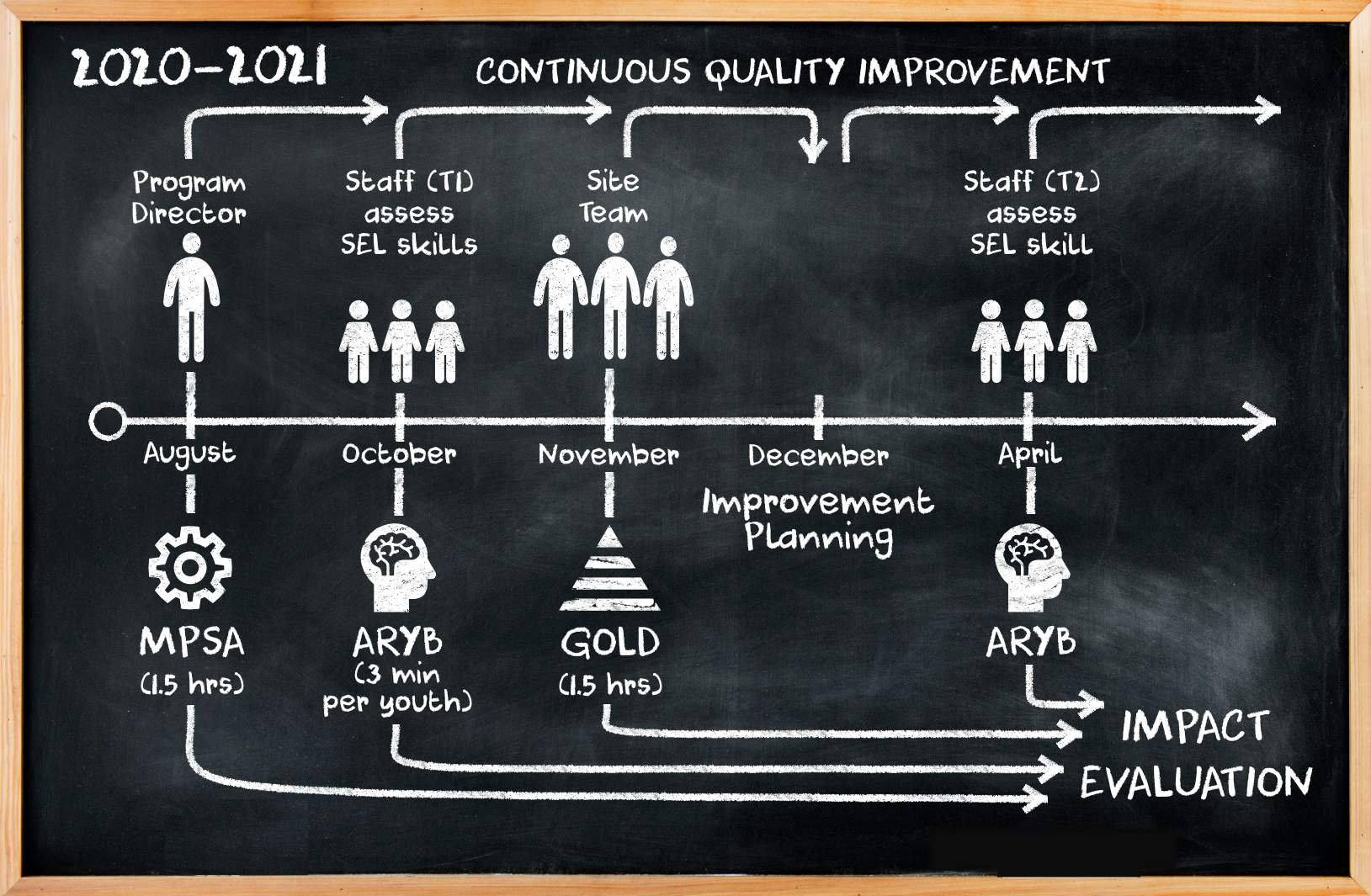Evolving the Standard for High Quality (Fall 2022)
In the prior two blogs, we talked about how a group of master afterschool teachers at 25 afterschool sites in Genesee County have responded to the pandemic years. One important area of evolution was the new service models that put staff in the field visiting homes and meeting parents at drop off sites, producing a wide…
Read More >> Evolving the Standard for High Quality (Fall 2022)
The State of Children in Afterschool
Like all managers I interviewed last fall, Keoshia, site manager for YouthQuest at Durant-Tuuri-Mott Elementary School, agreed that over 50% of this year’s students were behind academically. For that reason, the team at DTM Elementary afterschool is focused on math and literacy. However, for Keoshia and her team at DTM, the children’s socio-emotional skills are about…
Afterschool Excellence During Pandemic Years
The field of afterschool program services has evolved quickly since March 2020, from the pressing of resources at hand into responses to urgent new needs. These new practices may spell out the future of afterschool services and new roles for afterschool teachers. The new stuff can be broken into two chunks. First, there were new service…
How could OST address climate change?
With the publication of the IPCC report[1], it’s not difficult to conclude that our current political leadership is not going to take us where we need to go, and we can’t wait anymore. The scientists are telling us right now, in clear language, that the time is up: Major transformations in our thinking and behavior around…
How the Q-ODM impact model is a more cost-effective form of the quasi-experimental design (QED)
The Quality-Outcomes Design and Methods (Q-ODM) approach to program evaluation increases the use value of all estimates produced as part of an impact analysis. Put simply: We replace the “no-treatment” counterfactual condition (i.e., children who were not exposed to an afterschool program) with low-implementation conditions (e.g., children who were exposed to lower-quality instructional practices in an afterschool program)…
Why are Q-ODM’s Pattern-Centered Methods (PCM) More Realistic and Useful for Evaluators?
Pattern-centered theory and methods (PCM) can be used to tell simple and accurate stories about how real persons grow in real school and afterschool classrooms. Stories about the quality and outcomes (i.e., causes and effects) that are modeled using PCM are particularly useful because they can address questions related to “how” programs and classrooms work and “how much” children grow skills.
Introduction to White Paper 3
Greetings friends! In this third White Paper, Realist(ic) Evaluation Tools for OST Programs: The Quality-Outcomes Design and Methods (Q-ODM) Toolbox, we extend from the neuroperson framework for socio-emotional skills to a focus on evaluation design and impact evidence. Focusing on the methods used to evaluate out-of-school time (OST) programs and to assess the impact on student skill growth is a…
Introduction to White Paper 2
Welcome back! In this second white paper, Measuring Socio-Emotional Skill, Impact, and Equity Outcomes, we extend from the White Paper 1 skill framework to discuss implications for accurate measurement. We are pleased to share these hard-won lessons from two decades of trying to describe the actual outcomes of “broad developmentally-focused programs” – which means trying to figure…
Reflections on Our White Paper on Socio-Emotional Skills
In conjunction with the release of White Paper 1 this week – A Framework for Socio-Emotional Skills, Quality, and Equity – we want to mention a few of the highlights: What are socio-emotional skills? In our view, a person’s socio-emotional skills are integrated sets of mental and behavioral parts and processes (i.e., schemas, beliefs, and awareness); these integrated systems are socio-emotional skills and produce both basic…
Read More >> Reflections on Our White Paper on Socio-Emotional Skills
Introduction to QTurn White Papers
The first in a series of four, “Socio-Emotional Skills, Quality, and Equity,” provides a translational framework for understanding our relatively unique view of the key parts of a socio-emotional skill set. We develop a case for supplementing the traditional focus on student beliefs and behavior with a much more extensive focus on students’ emotional life and the attention skills necessary for becoming the primary authors of their own development.
A Compassionate Evaluation using the GOLD Assessment in Genesee Intermediate School District
In early 2020, COVID-19 rates were soaring. Masks, cleaning supplies, and clear information were in short supply. This was especially true for schools across the country. Teachers, parents, and students were unsure about what was going to happen next. On Thursday, April 1, 2020 (in-person) school was still in session in the Genesee Intermediate School District…
What Exactly is Compassionate Evaluation?
Compassion has a lot of definitions, but most have to do with recognition of suffering, action to alleviate suffering, and tolerance of discomfort during the action.[i] By April of 2020, we knew that our afterschool partners in Genesee County (including the city of Flint) Michigan, and many of the children and families that they served, were suffering.…
Continuous Quality Improvement and Evaluation in 2020: A Plan for 21st Century Community Learning Centers
During times of crisis when programs are under tremendous pressures, evaluation and assessment can be challenging. Programs enter triage mode, putting their limited time and energy into the most urgent tasks. This heightens the need for evaluation that reduces strain and improves capacity. When conditions that created the crisis are long-lasting, like the coronavirus pandemic, it…
QTurn’s Afterschool Evaluation Plan 2020
In partnership with the Michigan Department of Education and Michigan After-School Partnership, QTurn has put together a suite of evaluation tools specifically developed for afterschool programs during the 2020-21 school year – The Afterschool Evaluation 2020 (AEP2020). The Management Practices Self-Assessment (MPSA), Guidance for Learning at a Distance (GOLD), and the Adult Rating of Youth Behavior…
Defining High Quality for Afterschool Learning During the COVID-19 Pandemic
Since the onset of the coronavirus pandemic, as schools grappled with the sudden demand for remote instruction, afterschool and other out-of-school time (OST) programs have been striving to adapt. As programs expand their remote offerings and gradually reopen, there is a need for guidance. Delivering the same high-quality supports to children and youth at home is…
Read More >> Defining High Quality for Afterschool Learning During the COVID-19 Pandemic















